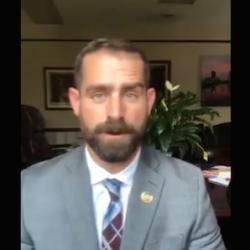That’s how Phil Lawler is characterizing the pro-life activist’s current circumstances, and he gives an interesting overview of what led to this point:
The controversy that finally hit the headlines last week is a sad one, a damaging one for the pro-life movement, but not a new one. It was all too easy to see it coming.
For years Father Pavone has sought autonomy for his organization, Priests for Life. His quest for independence caused some tension with the Archdiocese of New York, where he originally served. At first it seemed that tension was resolved when he moved to the Amarillo diocese. But it cropped up again with Bishop John Yanta, who had welcomed him to Texas. Finally it came to a head under Bishop Yanta’s successor, Bishop Patrick Zurek.
Bishop Zurek’s decision to recall Father Pavone to Amarillo, and restrict him to ministry there, was not a bolt from the blue, then. Father Pavone has disclosed that he had been discussing the possibility with his bishop for several months. No doubt both, the bishop and the priest, had been seeking advice from canon lawyers and support from friends, trying to influence each other, hoping to resolve the mounting tension without a public ruckus.
Especially in light of those behind-the-scenes negotiations, and the consultations that must have taken place, it is unfortunate that Bishop Zurek sloppily used the word “suspend” in the public announcement of his decision. Father Pavone was not suspended; he remains a priest in good standing. He was summoned to serve the Church in the diocese where he is incardinated. There is no question that the bishop has the authority to restrict a priest’s ministry in this way. Although Father Pavone has announced a canonical appeal, it is difficult to imagine how he could prevail.
In September 9 announcement, Bishop Zurek said that he took action because of “deep concerns regarding [Pavone’s] stewardship of the finances of the Priests for Life (PFL) organization.” But his concerns went deeper, he revealed. He was also worried about Father Pavone’s “incorrigible defiance to my legitimate authority as his Bishop.” Those two concerns, it becomes clear, were very closely entertwined.
Read the rest, including Lawler’s conclusion:
For years Father Pavone has run PFL as his own personal fiefdom. He has been answerable only to PFL board of directors—on which he and his paid subordinates have formed a solid voting majority. That long run of complete autonomy is now coming to an end. This is not a case in which a bishop has set out to squelch pro-life activism. It is a case in which a bishop has realized that a priest and a Catholic apostolate are both in urgent need of supervision.
Recognizing this reality may be a difficult process for Father Pavone. Until now, PFL has been his project: his baby. But he cannot continue running PFL the way he has been running it. If the mission of PFL is to continue and thrive, it will be under some new form of leadership.
Painful though it will be, Father Pavone should realize that the time has come to offer his baby up for adoption. He of all people should realize the most likely alternative: the baby will die.
Meantime, Ed Peters has added more of his thoughts here.
UPDATE: Comments are closed.











